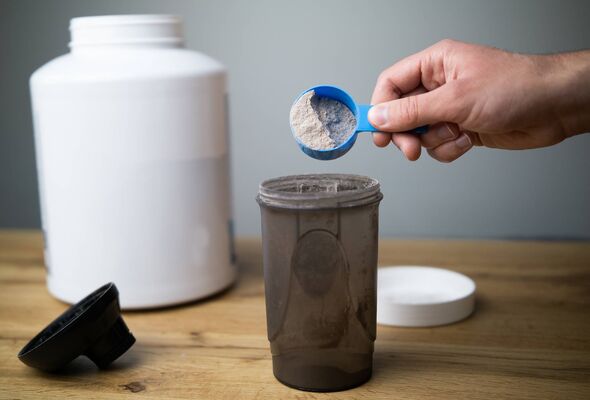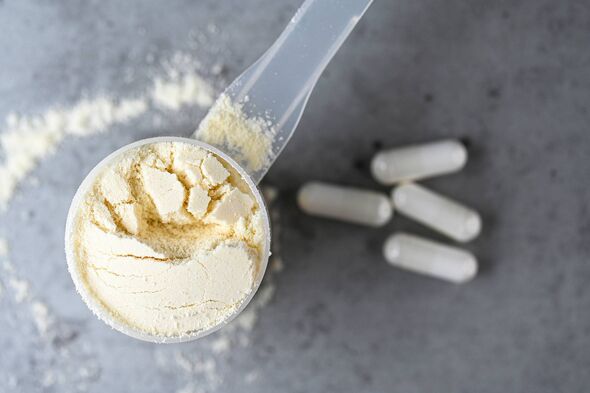This article contains affiliate links, we will receive a commission on any sales we generate from it. Learn more

The resident ITV doctor is sharing the benefits of the supplement (Image: ITV)
Dr Amir Khan has praised a supplement he insists ‘everyone should try’ owing to its extensive range of benefits. He even suggests that the supplement might help reduce a person’s chances of developing Alzheimer’s Disease, with early results of some studies looking “promising”.
Dr Khan, MB, ChB (Hons), MRCGP, DCH, DRCOG, serves as an NHS general practitioner at The Ridge Medical Practice in Bradford. He has gained widespread recognition for sharing his medical knowledge online and through television appearances. The doctor frequently features on programmes including ITV‘s Good Morning Britain, Lorraine, This Morning, and Loose Women, reports the Mirror.
READ MORE: Doctor cautions Brits about supplement taken by millions
READ MORE: Dr Amir Khan urges women to try £20 Boots cream ‘nobody’s talking about’
During his free time, he provides health guidance and recommendations through his social media platforms. To reach a broader audience nationwide, the GP has also launched a fresh podcast series alongside co-presenter Cherry Healey. Prior to the launch of their latest episode, due out this week, Dr Khan offered his 13,400 Instagram followers a preview of what the forthcoming programme would cover.
Posting a brief excerpt from the new episode, Dr Khan announced: “The SECRET supplement you HAVE to try! Don’t miss next week’s episode of No Appointment Necessary!” During the programme, the NHS medic and Cherry discuss supplements, debunking popular misconceptions and disclosing the three supplements Dr Amir advocates—creatine being one of them.
Creatine is a compound that occurs naturally within the body and can also be found in certain foods, supplying energy to muscle and brain tissues alike. Creatine, typically taken as a dietary supplement in the form of creatine monohydrate, is popular among athletes for enhancing performance and increasing muscle mass during short, high-intensity workouts.
However, it’s also been suggested that it could support brain function. In a video clip, Dr Khan poses the question: “What is the hot topic around creatine now? We know it works for people who are in sports, but does it work for everyone else as well?”.
He continues: “There’s really interesting research looking at it to help reduce the risk or progression of Alzheimer’s dementia. We haven’t got strong enough results to say yes now, but there are really promising results coming out that just make me go ‘wow’, this could be really important.”
The video concludes with Dr Khan strongly recommending: “And that is why I really think, as we get older, it’s one of the supplements I would strongly recommend.”
Creatine can be purchased in various forms, such as powder and capsules, from most health and fitness retailers. You can find creatine at Boots, Superdrug and Holland and Barrett. For instance, Boots sells a bottle of 250 Myprotein Impact Creatine Monohydrate Capsules for £20, which equates to 8p per capsule.
Creatine is a popular supplement among athletes and fitness enthusiasts. It’s primarily used to enhance performance in high-intensity, short-duration activities such as weightlifting, sprinting, and team sports. It’s one of the most researched and effective dietary supplements for boosting strength, power, and muscle growth.
What are the benefits of creatine?
Dr Khan has highlighted that there are other reasons to take creatine beyond athletic performance. These include potential health benefits related to ageing and possibly enhancing brain function to combat certain severe neurological conditions.
Creatine aids in regenerating adenosine triphosphate (ATP), the body’s primary energy source. This allows you to train harder and longer, thus increasing strength and power. It also increases the water content in muscle cells, causing them to swell and triggering pathways leading to muscle growth.
Over time, this improved training performance results in increased muscle mass. Creatine is known to minimise muscle cell damage and inflammation that can occur during intense workouts, thus aiding in quicker recovery between sets and workouts. It’s particularly beneficial for athletes involved in power sports like weightlifting, sprinting, and football, as it enhances performance during repeated, short bursts of intense activity.
Similarly, creatine can boost phosphocreatine levels in the brain, leading to increased ATP production. This can result in improved memory, reasoning skills, and mental clarity, especially during periods of stress or sleep deprivation.

Creatine is commonly used by athletes (Image: Getty)
For the elderly, creatine may help counteract the natural decline in muscle mass and bone mineral density that comes with ageing. When combined with resistance training, it can enhance both physical performance and cognitive health.
Some research suggests that creatine might offer therapeutic benefits for neurological conditions such as Parkinson’s and Huntington’s diseases, although more studies are needed.
Is creatine a potential deterrent against dementia?
While there isn’t enough evidence yet to definitively confirm that creatine can lower the risk of dementia, some studies are showing promising results. The effect of creatine on the treatment of Alzheimer’s disease is still under investigation, but early findings are hopeful.
A preliminary study conducted in 2025 involving human patients with Alzheimer’s suggested that creatine supplementation increased brain creatine levels and was associated with improvements in cognitive performance. The initial study only included 20 participants and lacked both a placebo control and blinding. Due to these constraints, more extensive clinical trials are required before any definitive conclusions can be drawn.
Creatine has the potential to safeguard brain cells against harm from oxidative stress and inflammation, both of which are recognized contributors to neurodegenerative diseases. A recent pilot study involving humans showed that taking creatine supplements was linked to better performance on various cognitive assessments, particularly in areas such as working memory, attention, and reading.
In other research, studies using mouse models suggest that creatine may boost brain energy metabolism and reduce disease biomarkers. However, larger clinical trials are needed to confirm these results and determine whether creatine can be utilised as a preventive or treatment strategy.

Some early studies show that it may help support brain function (Image: Getty)
Currently, there is no clinically approved dosage for administering creatine in the context of neurological disorders. In the preliminary study, a high dosage of 20 grams per day was used over eight weeks to increase brain levels.
If you or a loved one is battling Alzheimer’s disease, it’s crucial to consult a doctor before starting any new supplement, such as creatine. Although it is generally considered safe for healthy individuals, those with existing health conditions should discuss potential risks and benefits with their healthcare professional.
Important considerations
Always consult your GP before attempting anything new or making any dramatic alterations to your diet and lifestyle. Creatine ranks amongst the most researched and secure supplements on the market, although some people might encounter minor, short-term side effects.
One frequent consequence is an early rise in weight owing to increased water retention in your muscles rather than fat accumulation. Some people may also suffer digestive upset, queasiness, or loose bowels, especially during a “loading phase” involving high doses.
Maintaining adequate hydration and opting for a smaller daily amount can prove helpful. For those in good health, there is no proof that creatine supplementation adversely affects kidney function. Nevertheless, individuals with pre-existing kidney problems should consult medical professionals before beginning supplementation.
